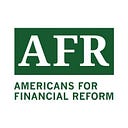March 30, 2023
TO: Interested parties
FROM: Americans for Financial Reform
RE: Fifth Edition: Banking Crisis of ’23 Brief
Not a Social Media Crisis
- “Probably the 2023 banking crisis at its dumbest,” someone emailed us. Still, witness the WSJ asserting that deposits used to be sticky, “but social media and smartphone banking apps seem to have changed that.”
- Thurow said about the Asian financial crisis in the 1990s something that’s true of any panic: the first people to know, and who start it, are the insiders. By definition they work in the dark.
- Sure enough, read Bloomberg here for a taste: “in the highly networked tech industry, public social media feeds didn’t actually drive the fast-growing anxiety over SVB’s financial position — that happened in private … By the time most people figured out that a bank run was a possibility on Thursday, March 9, it was already well underway.”
Chair McHenry. At the end of Wednesday’s hearing, it was clear the new chair of HFSC fancies himself the tip of the spear of a “don’t prejudge it” response that is above politics. But he did already prejudge it. And let’s not pretend money plays no role here.
- McHenry told the American Bankers Association last week (hat tip: The Lever) that critics who pounced on S.2155 were “unbecoming” and “hackish,” adding “We need to be a little more patient and find out what the facts are.”
- But then McHenry prejudged it himself right away: the 2018 law “did not touch at all the facts and circumstances for these two failed banks,” he asserted
- McHenry got $275k in contributions since 2013 from executives at Signature Bank, his second-largest career contributor, and was at a fundraiser there days before the crisis. He got $10k from SVB’s PAC as well.
Germans Have Been Here Before
- Prominent European economist Hans-Werner Sinn draws parallels with this crisis and the Gründerkrach of 1873. It also involved startups (the name derives from Gründerzeit (the “time of founders”) in Germany’s early industrial revolution.
- New corporate governance laws allowed mark-to-market accounting, leading to speculation on a thin cushion of equity.
- After an 1874 reform (anyone have this article?), companies had to give the lower of either the current market value or the historical purchase price. “Germany’s companies were induced to build up hidden or ‘silent’ reserves on their balance sheets in good times to cushion against turmoil, thereby making the German banking system more stable.”
Yellen. A speech today ticks off multiple areas of work in response. “These events remind us of the urgent need to complete unfinished business: to finalize post-crisis reforms, consider whether deregulation may have gone too far, and repair the cracks in the regulatory perimeter that the recent shocks have revealed. We must also address new areas of risk.”
Not Lapse of Supervision. Jeremy Kress has a great point: “Proponents of ‘tailoring’ oppose strengthening rules for regional banks because SVB was just a ‘lapse of supervision’ by the Fed. They ignore that a second $100B+ bank failed and a third required an industry-led bailout. That’s 1/6 of all the $100B-$250B banks!”
White House Plans. Reports suggest it will call for banking regulators to do their thing, but it is “unlikely that the administration will ask Congress in the immediate future to undo a deregulation law passed five years ago with bipartisan support.”
Deposit Insurance. Khanna (D) is working on a bill for temporary deposit guarantee on uninsured payroll accounts. Powell thinks changes to deposit insurance are worth talking about. Chair Brown might hold a hearing.
Number of Probes. At least five, but are there more? 1. The Fed’s Barr report, scope still somewhat unclear. 2. The Fed IG is doing something. 3. Various elected officials have asked for a GAO report. 4. Gruenberg plans an FDIC report on its supervision. 5. And the FDIC will report on deposit insurance.
Bank Accounting. WSJ reports that six large U.S. banks “switched the classifications on more than $500 billion of their bond investments last year.” That’s PNC, Schwab, JPM, Truist, Wells Fargo, and US Bank. “Or some banks, excluding the unrealized losses from their balance sheets allowed them to report robust levels of capital when in reality their assets were worth much less.”
Deposit Insurance. From Bloomberg: FDIC “looking to limit the strain on community lenders by shifting an outsize portion of the expense toward much larger institutions.” Which is what Gruenberg hinted at this week. A proposal coming in May.
Developing World. The Fed makes policy for the globe, like it or not. The impact of higher interest rates on the developing world has been unwelcome, per the World Bank. It is now talking about a “lost decade” in a new report, given the added impact of financial market stress.
Politics. Morning Money runs through who’s up and who’s down, has polls, etc.
New Series on Crisis of ’23. In The American Prospect. Articles on the FHLB system, stopping bank runs with greater capital requirements, and public banking.
